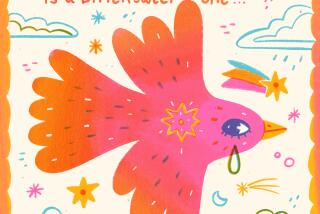FICTION
- Share via
HOW I CAME WEST, AND WHY I STAYED by Alison Baker (Chronicle Books: $9.95, paperback original; 192 pp.) “It’s only through defects and injuries that they can identify individuals,” one of Baker’s characters, an authority on the lesser flamingo, says. “The healthy ones who can live normally are essentially identical.” And this, in fact, is just how Baker pins her characters right on to your heart. Their myriad defects and injuries: Giselle Luna who spends half her life in a blind watching lesser flamingos and the other half singing in a jazz bar; Latissimus, the Siamese twin who says “Do you want to feel my heart?” and Harry Hentoff, the cabdriver who is also an expert at detecting lumps in women’s breasts. These are characters one keeps, and they are rivaled in their strange individuality only by the animals that also play a large part in Baker’s stories: the one-eyed frogs, the Stanley cranes that whisper “Free us, free us, if not freedom, food!” and the wild, elusive cheerleaders that travel in packs in the Montana mountains and have teeth “brighter than Venus, Jupiter, and Mars in alignment.” In the beautiful story, “Clearwater and Latissimus,” black Siamese twins joined at the heart come one year to the author’s school. After one week, “everyone was a Siamese twin. Wherever you were joined, though, was the place your heart was.” When they leave for Chicago to be, as Latissimus says, “among their own kind,” Baker writes: “It didn’t occur to us that he meant anything besides this: that Chicago was a city of Siamese twins, where everybody had someone who shared his heart.”
More to Read
Sign up for our Book Club newsletter
Get the latest news, events and more from the Los Angeles Times Book Club, and help us get L.A. reading and talking.
You may occasionally receive promotional content from the Los Angeles Times.










